- Clone
- SKII.4 (See other available formats)
- Regulatory Status
- RUO
- Other Names
- Poliovirus receptor (PVR), nectin-like 5
- Isotype
- Mouse IgG1, κ
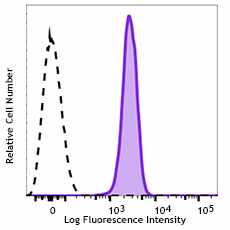
-

Human histiocytic lymphoma cells (U937 cells) were stained with anti-human CD155 (clone SKII.4) APC/Fire™ 750 (filled histogram) or mouse IgG1, κ APC/Fire™ 750 isotype control (open histogram).
| Cat # | Size | Price | Quantity Check Availability | ||
|---|---|---|---|---|---|
| 337625 | 25 tests | $171.00 | |||
| 337626 | 100 tests | $382.00 | |||
CD155, known as poliovirus receptor (PVR) or nectin-like 5, is a 70 kD type I transmembrane glycoprotein. It is a nectin-like molecule belonging to Ig superfamily. CD155 is primarily found on endothelial cells, monocytes, epithelia and central nervous system. CD155 is an adhesion molecule involved in cell-cell and cell-matrix adhesion through interaction with CD226, CD96 (Tactile), nectin-1, -2, and -3 (CD111, CD112, CD113), and vitronectin. It also serves as a receptor for poliovirus and cytomegalovirus.
Product Details
- Verified Reactivity
- Human
- Antibody Type
- Monoclonal
- Host Species
- Mouse
- Immunogen
- SK-N-S1 human neuroblastoma cells.
- Formulation
- Phosphate-buffered solution, pH 7.2, containing 0.09% sodium azide and BSA (origin USA)
- Preparation
- The antibody was purified by affinity chromatography and conjugated with APC/Fire™ 750 under optimal conditions.
- Concentration
- Lot-specific (to obtain lot-specific concentration and expiration, please enter the lot number in our Certificate of Analysis online tool.)
- Storage & Handling
- The antibody solution should be stored undiluted between 2°C and 8°C, and protected from prolonged exposure to light. Do not freeze.
- Application
-
FC - Quality tested
- Recommended Usage
-
Each lot of this antibody is quality control tested by immunofluorescent staining with flow cytometric analysis. For flow cytometric staining, the suggested use of this reagent is 5 µL per million cells in 100 µL staining volume or 5 µL per 100 µL of whole blood.
* APC/Fire™ 750 has a maximum excitation of 650 nm and a maximum emission of 774 nm. - Excitation Laser
-
Red Laser (633 nm)
- Application Notes
-
Additional reported applications include: block binding of PVR ligands CD226 and CD96 to PVR, immunoprecipitation, and western blot.
-
Application References
(PubMed link indicates BioLegend citation) -
- Fuchs A, et al. 2004. J. Immunol. 172:3994
- RRID
-
AB_2800897 (BioLegend Cat. No. 337625)
AB_2800897 (BioLegend Cat. No. 337626)
Antigen Details
- Structure
- Type I glycoprotein, Ig superfamily
- Distribution
-
Monocytes, endothelial cells, epithelia, central nervous system
- Function
- Cell-cell and cell-matrix adhesion
- Ligand/Receptor
- CD226, CD96, nectin-1, -2, and -3, vitronectin, CD155, poliovirus
- Cell Type
- Endothelial cells, Epithelial cells, Monocytes, Tregs
- Biology Area
- Immunology, Innate Immunity
- Molecular Family
- Adhesion Molecules, CD Molecules, Immune Checkpoint Receptors
- Antigen References
-
1. Zola H, et al. eds. 2007. Leukocyte and Stromal Cell Molecules:The CD Markers. Wiely-Liss A John Wiley & Sons Inc, Publication
2. Bottino PD, et al. 2005. Mol. Immunol. 42:463
3. Tahara-Hanaoka S, et al. 2004. Intl. Immunol. 16:533 - Gene ID
- 5817 View all products for this Gene ID
- UniProt
- View information about CD155 on UniProt.org
Other Formats
View All CD155 Reagents Request Custom Conjugation| Description | Clone | Applications |
|---|---|---|
| PE anti-human CD155 (PVR) | SKII.4 | FC |
| Purified anti-human CD155 (PVR) | SKII.4 | FC,WB,IP |
| PerCP/Cyanine5.5 anti-human CD155 (PVR) | SKII.4 | FC |
| PE/Cyanine7 anti-human CD155 (PVR) | SKII.4 | FC |
| PE/Dazzle™ 594 anti-human CD155 (PVR) | SKII.4 | FC |
| APC anti-human CD155 (PVR) | SKII.4 | FC |
| Alexa Fluor® 647 anti-human CD155 (PVR) | SKII.4 | FC |
| Biotin anti-human CD155 (PVR) | SKII.4 | FC |
| TotalSeq™-A0023 anti-human CD155 (PVR) | SKII.4 | PG |
| APC/Fire™ 750 anti-human CD155 (PVR) | SKII.4 | FC |
| Brilliant Violet 510™ anti-human CD155 (PVR) | SKII.4 | FC |
| Brilliant Violet 421™ anti-human CD155 (PVR) | SKII.4 | FC |
| FITC anti-human CD155 (PVR) | SKII.4 | FC |
| Alexa Fluor® 700 anti-human CD155 (PVR) | SKII.4 | FC |
| TotalSeq™-B0023 anti-human CD155 (PVR) | SKII.4 | PG |
| TotalSeq™-C0023 anti-human CD155 (PVR) | SKII.4 | PG |
| TotalSeq™-D0023 anti-human CD155 (PVR) | SKII.4 | PG |
Compare Data Across All Formats
This data display is provided for general comparisons between formats.
Your actual data may vary due to variations in samples, target cells, instruments and their settings, staining conditions, and other factors.
If you need assistance with selecting the best format contact our expert technical support team.
-
PE anti-human CD155 (PVR)
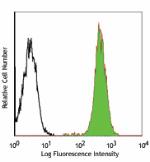
Human histiocytic lymphoma cells U-937 stained with SKII.4 P... -
Purified anti-human CD155 (PVR)
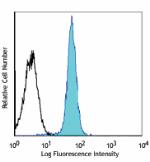
Human histiocytic lymphoma cells U-937 stained with purified... -
PerCP/Cyanine5.5 anti-human CD155 (PVR)
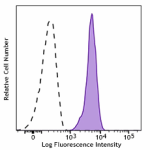
Human histiocytic lymphoma cells (U937 cells) were stained w... -
PE/Cyanine7 anti-human CD155 (PVR)
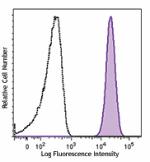
U937 cells were stained with CD155 (clone SKII.4) PE/Cyanine... -
PE/Dazzle™ 594 anti-human CD155 (PVR)
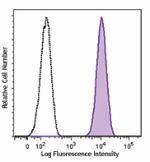
U937 cells were stained with CD155 (clone SKII.4) PE/Dazzle&... -
APC anti-human CD155 (PVR)
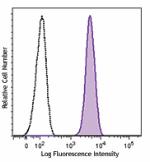
U937 cells were stained with CD155 (clone SKII.4) APC (fille... -
Alexa Fluor® 647 anti-human CD155 (PVR)
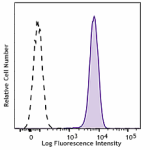
U937 cells were stained with CD155 (clone SKII.4) Alexa Fluo... -
Biotin anti-human CD155 (PVR)
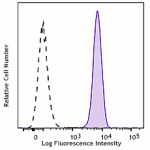
U937 cells were stained with biotinylated CD155 (clone SKII.... -
TotalSeq™-A0023 anti-human CD155 (PVR)
-
APC/Fire™ 750 anti-human CD155 (PVR)
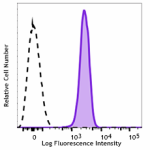
Human histiocytic lymphoma cells (U937 cells) were stained w... -
Brilliant Violet 510™ anti-human CD155 (PVR)
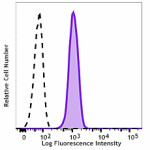
Human histiocytic lymphoma cells (U937 cells) were stained w... -
Brilliant Violet 421™ anti-human CD155 (PVR)
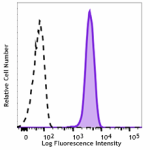
Human histiocytic lymphoma cells (U937 cells) were stained w... -
FITC anti-human CD155 (PVR)
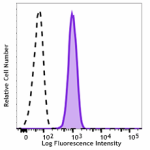
Human histiocytic lymphoma cells (U937 cells) were stained w... -
Alexa Fluor® 700 anti-human CD155 (PVR)
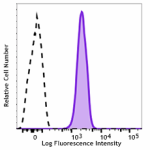
Human histiocytic lymphoma cells (U937 cells) were stained w... -
TotalSeq™-B0023 anti-human CD155 (PVR)
-
TotalSeq™-C0023 anti-human CD155 (PVR)
-
TotalSeq™-D0023 anti-human CD155 (PVR)
